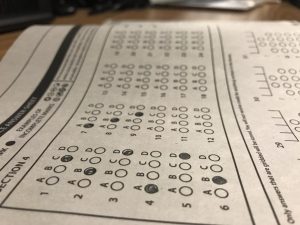Testing Takes a Toll on Teens
Mar 9, 2020
Only a few months ago, the school year began. Now, testing season is fast approaching and yet another April and May are on track to be ruined by standardized testing. While we all have our own opinions on testing, it is clear to say that standardized testing’s cons outweigh its pros because it is an inefficient way of measuring one’s knowledge, it takes a massive toll on students’ confidence and it causes additional unnecessary stress.
Generally, a test is administered on a span of about one or two days when a personal problem can occur, and since the results are based on one’s performance on just those two days, it is highly unlikely that the results are an accurate representation of the entirety of a student’s knowledge. During those days, so many things can go wrong, including things that they cannot control which still affect their ability to test. They could be dealing with domestic problems, problems with friends, or even an illness. So many outside factors can infringe on a stable testing environment that even if the student was taught well and was able to understand the content of the subject, their test scores might not reflect that ability because of personal problems or weak test taking skills.
“I do not believe it is accurate to base the entire year on the results of something that occurred in a span of three or four tests,” freshman Grace Urbita said.
In relation to the inaccurate results as discussed before, these tests can have a belittling effect on a student’s confidence. The school system has developed the testing system to create an arbitrary importance for these tests, making it seem like the results will have a huge impact on their futures. If the student has underdeveloped test taking skills leading to poor results, this will take a toll on their confidence level making them believe that they deserved those results and now underestimate their own abilities. Additionally, the pressure put on these students to excel stresses them out more than the school environment itself does. The school system sends them this message by creating a stressful environment during testing season to push them to score better on the test. This stress is also perpetrated by the schools themselves because higher scores on these tests increase the school’s ranking in the school system.
One might say that testing is not actually about the students but, rather, that they are given to see how well the teachers were able to transfer their knowledge on their subject down to their students. Nevertheless, students are still under intense pressure, especially if they are the ones taking the test. It is a chain reaction: schools want to grow and develop, and to do so, they need to have high test scores, so they pressure their teachers to push the subject material harder on the students, which eventually lead to the increased amount of stress that are put on the students. Even if it is unintentional, the pressure is still put upon students to thrive on standardized tests.
While testing in a classroom setting can be a good way to see if a student has been able to grow in a short amount of time, standardized testing is an inefficient system that continues to grow and be forced on the students causing increased stress and decreased confidence levels. These tests began as simple assessments that track how much improvement was made in a year and have gained the power to form what the student’s next course rigor will look like or what college they will attend. The amount of impact these tests have on student’s lives should be reduced because just a paper and a pencil can not accurately show what a student is capable of.











